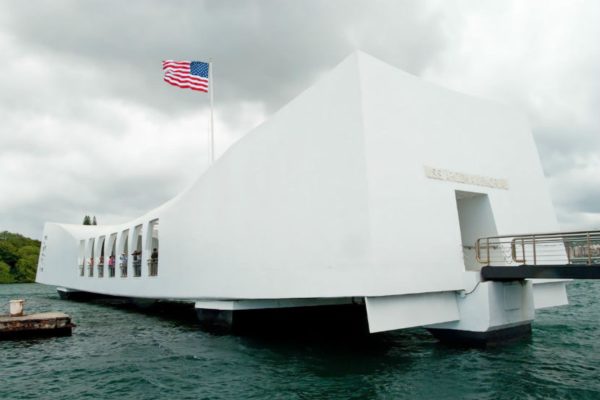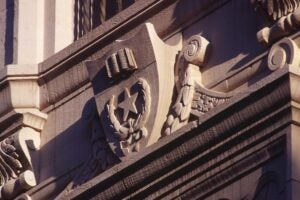We are living in a trying time for our democracy. Many of us are questioning the survival of our deeply divided society. Seventy-five years ago, Americans faced an even graver danger when Japan attacked Pearl Harbor, destroying much of our navy and killing 2,403 Americans. The enemy then was a foreign power, but the challenges at home were not very different from what we see around us today.
The American response to Pearl Harbor showed the power of public service to bring distrustful, hurting citizens together and forge a stronger nation. We can learn from that experience today as we reflect on where to begin in healing our more recent wounds and re-defining the American promise for the twenty-first century.
At the time of the Pearl Harbor attack, the United States was deeply divided. Most Americans had not recovered the wealth they lost during the Great Depression, and they remained insecure about their futures in a weak economy. Insecurity fed bigotry and intolerance.
The vast majority of Americans opposed war against the fascist powers. They remembered the costs of the First World War and the unsatisfying results.
They hated many elements of fascism but did not believe it was worse than Soviet communism, British imperialism, or the continued growth of “Oriental,” “African” and “Jewish” groups in the lands conquered by the fascists. “America First” was a rallying cry for ordinary white Americans who felt mistreated by elites, scarred by economic difficulties and dislocated by international policies.
The Japanese intended their attack to inflame the divisions in the United States, much as Russian, Chinese, the Islamic State group and North Korean leaders seek to exploit our divisions today.
But contrary to these expectations, the United States emerged more united in 1941 because it had leaders, especially President Franklin Roosevelt, who tied the war effort to public service, not partisan positions or special interests.
Defending American territory and defeating those who threatened it, Roosevelt spoke directly to citizens: “Every single man, woman and child is a partner in the most tremendous undertaking of our American history. We must share together the bad news and the good news, the defeats and the victories — the changing fortunes of war.”
The American people heard the call and responded. They would collectively serve their country in different forms — some on the battlefield, many more in factories — to improve the world, despite their lingering reservations and differences of viewpoint.
Roosevelt articulated a big goal for all groups, and he made everyone a participant, a stakeholder, and, yes, a public servant. He called the war effort a “covenant with each other before all the world.”
After the war, the public service ethic inspired by Pearl Harbor continued. Americans from all backgrounds served their country in the military, politics, philanthropy and many other fields.
Through the G.I. Bill, public service provided access to education and homeownership, both designed to bring citizens together in improving themselves and sharing neighborhoods.
For the pre-baby boomer generation that lived through Pearl Harbor as young men and women, working for your country, paying taxes for the common good and defining your success by your public service were essential parts of citizenship. They built the schools, roads, power plants and businesses that continue to undergird our prosperity.
But by the late 1960s, amid controversies over civil rights and an unpopular war in Vietnam, many Americans rejected public service. Bipartisan agreement in 1973 to eliminate conscription and make the military an all-volunteer profession contributed to an abandonment of public service as a marker of citizenship.
By the end of the century, the majority of our nation’s business, academic and media elites had never served their country in any serious way — a complete reversal from a generation earlier, when public service was a necessary step to leadership and respectability.
Today, we will never overcome our current divisions by continuing to argue over the issues that divide us. Nor will we rally together magically behind a charismatic outsider who promises to blow it all up.
The lesson of Pearl Harbor is that a divided nation needs a common mission and a shared commitment to public service to build new bonds for cooperation, as occurred 75 years ago.
Programs like Teach for America, AmeriCorps, and the Peace Corps are a start, but they remain very small. Our citizens can do so much more.
We should begin with our crumbling infrastructure and fighting terrorism, two topics that received extensive attention in the recent presidential campaign.
Our national and state leaders should create new avenues for young Americans to get involved in addressing these needs, perhaps volunteering their skills for a year or two, followed by assistance with education.
Young men and women can apply their talents as engineers, translators, social workers and even soldiers. They will learn to work with people very different from themselves and take pride in contributing to the public good. They will define their success not just in what they earn, but how they serve their fellow citizens.
Our divided country needs a new generation to get out of its segregated neighborhoods and away from its electronic devices to work together in public service. That is what the Pearl Harbor generation did when attacked by a foreign foe. Young men and women are fed up with politics as usual, and they are eager to become another “greatest generation,” if only we will give them a chance.
Jeremi Suri holds the Mack Brown Distinguished Chair for Leadership in Global Affairs at The University of Texas at Austin. His newest book, forthcoming in 2017, is “The Impossible Presidency: The Rise and Fall of America’s Highest Office.”
A version of this op-ed appeared in the Houston Chronicle and the Waco Tribune Herald.
To view more op-eds from Texas Perspectives, click here.
Like us on Facebook.




